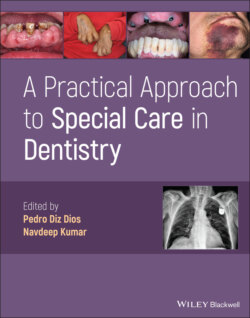Читать книгу A Practical Approach to Special Care in Dentistry - Группа авторов - Страница 221
Aetiopathogenesis
ОглавлениеType 1 diabetes: ~8% (previously known as insulin‐dependent or juvenile‐onset)The beta cells in the pancreas produce little or no insulinExogenous insulin must therefore be administered throughout the patient's lifeMost cases have an autoimmune aetiology, although some are idiopathic
Type 2 diabetes: ~90% (previously known as non‐insulin‐dependent or adult‐onset)The insulin receptors in the target tissues show reduced sensitivity to the action of insulin (insulin resistance), although insulin production can be normalAs the disease progresses, a lack of insulin may also developGenerally associated with a genetic predisposition, obesity or metabolic syndrome (combination of diabetes, hypertension and obesity)
Gestational diabetesTriggered by an increase in insulin resistance that causes impaired glucose tolerance during pregnancy
Secondary diabetes can be caused by endocrinopathies (e.g. acromegaly, Cushing disease), drugs (e.g. corticosteroids) or pancreatic disease (surgery, tumour or inflammation)
